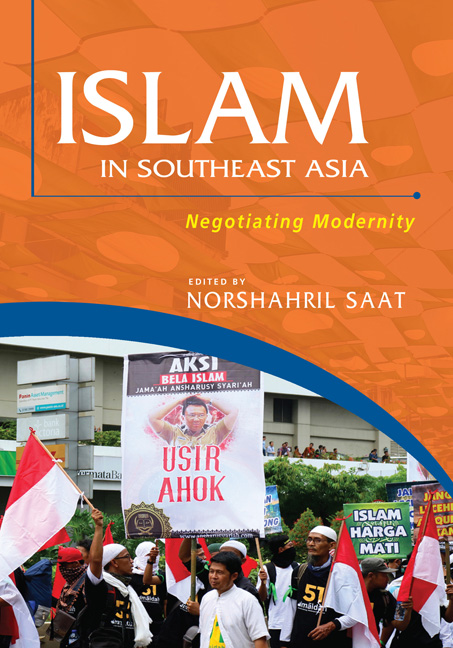Book contents
- Frontmatter
- Contents
- Preface
- About the Contributors
- 1 Introduction
- Section I Malaysia
- Section II Indonesia
- 5 The Middle East Influence on the Contemporary Indonesian “Campus Islam”
- 6 Contemporary Middle Eastern Islamic Thought and its Transmission in Indonesia: A Critical Assessment
- 7 Plural Islam and Contestation of Religious Authority in Indonesia
- 8 Preachers-cum-Trainers: The Promoters of Market Islam in Urban Indonesia
- Section III Singapore
- Index
5 - The Middle East Influence on the Contemporary Indonesian “Campus Islam”
from Section II - Indonesia
Published online by Cambridge University Press: 08 June 2019
- Frontmatter
- Contents
- Preface
- About the Contributors
- 1 Introduction
- Section I Malaysia
- Section II Indonesia
- 5 The Middle East Influence on the Contemporary Indonesian “Campus Islam”
- 6 Contemporary Middle Eastern Islamic Thought and its Transmission in Indonesia: A Critical Assessment
- 7 Plural Islam and Contestation of Religious Authority in Indonesia
- 8 Preachers-cum-Trainers: The Promoters of Market Islam in Urban Indonesia
- Section III Singapore
- Index
Summary
INTRODUCTION
Before Indonesia's independence in 1945, Muslim elites in the country learned about Islamic reformism through their experience in modern schools, which were heavily influenced by religious renewers in the Middle East. Their enrollment in these schools awakened their political awareness. Similar borrowing of intellectual and political ideas also happened among Muslim student activists in Indonesian campuses today. This phenomenon, which I refer to as “campus Islam” gained traction after the 1998 reformasi era. The number of Islamic movements and study groups in university campuses grew, and they thrived not only in Islamic universities, but in secular ones as well. Their growth in many secular campuses can be attributed to the influence of transnational Islamic movements. In fact, these student groups are not merely incorporating ideas from their Middle Eastern counterparts, but are actively involved in the movements’ activities (Anwar 2009, p. 350). In Indonesia, Middle East ideologies transmitted through these movements and organizations include Shi'ism (Iran), Ikhwanul Muslimin (Egypt), Salafi (Saudi), Hizbut Tahrir (Palestine) and Hizmet (Turkey).
I refer to individuals involved in these transnational Islamic groups as “global santris” (Machmudi 2008, p. 48). They are defined as devout Muslims who are not only promoting ideas of the Middle East movements and organizations, but are also calibrating and designing their societies to mirror the established movements and organizations there. Conflicts between these new global santri movements and Indonesia's mainstream Islamic organizations Nahdlatul Ulama (NU) and Muhammadiyah are bound to happen. To counter these global movements in Indonesia, both NU (traditionalist) and Muhammadiyah (modernist) introduced the terms Islam Nusantara and Islam Berkemajuan respectively. The purpose of Islam Nusantara is to make the local traditions of the past an essential part of how Islam is understood. On the other hand, Islam Berkemajuan emphasizes on modernity and advancement.
This chapter discusses how several global Islamic movements originating from the Middle East mould contemporary Indonesian Islam, particularly how their Indonesian chapters responded to the political developments in Egypt, Tunisia, Libya, and Syria, and especially the Arab Spring in 2011. Political turmoil in the Middle East have elicited varying responses from these transnational movements in Indonesia which were active in the campuses.
- Type
- Chapter
- Information
- Islam in Southeast AsiaNegotiating Modernity, pp. 91 - 111Publisher: ISEAS–Yusof Ishak InstitutePrint publication year: 2018



